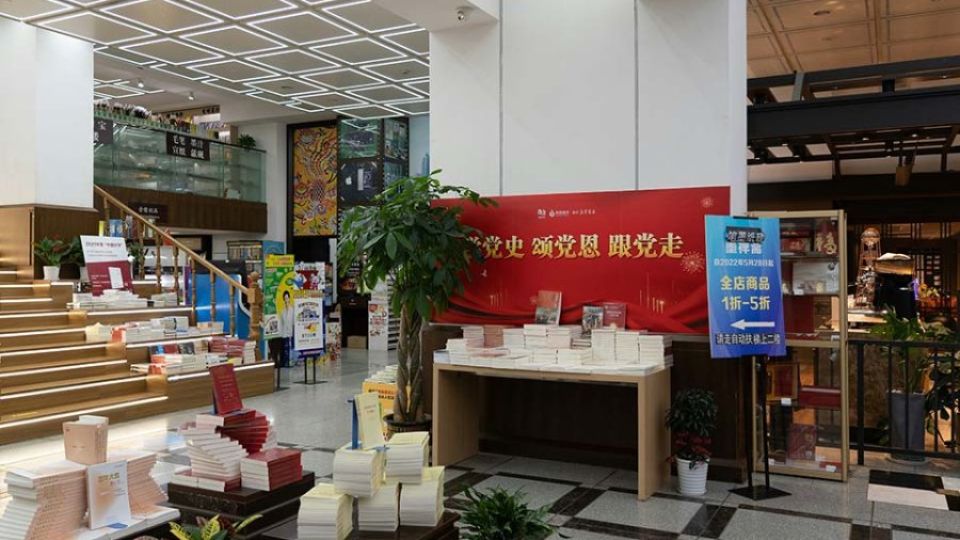October 25, 2024
BEIJING – A growing number of Chinese officials have been punished for illicit reading as the Communist Party of China (CPC) tightens its grip on the personal lives of cadres, increasing its policing of ideological purity amid growing domestic challenges.
Reading or possessing “banned books” or illegal publications containing content that “undermined the party’s solidarity and unity” are some of the accusations increasingly pinned on disgraced party cadres by party anti-graft agencies.
Associate Professor Lai Hongyi from the University of Nottingham’s School of Politics and International Relations said the tougher clampdown could be an attempt to sustain economic growth and ensure political stability.
“The nation is now facing mounting economic challenges, and the leadership is doing its best to minimise negative news and voices and promote the positive ones,” said Prof Lai.
China’s economy saw its slowest growth in more than a year at 4.6 per cent in the third quarter of 2024.
At least 15 party cadres have been accused of illicit reading or possessing forbidden materials so far in 2024, up from around eight in 2023.
The latest to be punished was Li Bin, a former vice-director of the People’s Congress, or legislature, in Mudanjiang, in the north-eastern Heilongjiang in late September 2024.
All such accusations have resulted in the officials’ expulsion from the CPC, which effectively ended their political careers.
In some cases, it may lead to criminal investigations, as in the case of Zhu Congjiu, former vice-governor of the eastern province of Zhejiang. In November 2023, he was accused of bringing illegal publications into China and reading them over a long period of time, among other crimes. He eventually pleaded guilty to bribery charges in court in September 2024, with the verdict still pending.
Citing the Chinese idiom, “kill the chicken to scare the monkey”, Assistant Professor Benjamin Ho, a China expert at Nanyang Technological University’s S. Rajaratnam School of International Studies, said the uptick in naming and shaming these cadres is meant to set an example so others will fall in line.
“The reality is that, as a party member, you pledge allegiance to the party above whatever your personal inclinations may be. So the idea that you have a personal life, anything that is untouched by the party, is an illusion,” he said.
A clear example, he said, is that senior Chinese officials are required to hand in their passports for “safekeeping” and must get approval for any overseas travel, even for personal trips.
This intensified crackdown on illicit reading by party cadres appears to have broadened to include bookstores, with some owners finding their businesses subjected to increased scrutiny.
One such bookstore was Jifeng Bookstore in Shanghai, which was effectively forced out of business in 2018 after five years of operating in an increasingly hostile environment.
Despite its never carrying “banned books” and selling only state-approved books, Jifeng’s owner Yu Miao told The Straits Times that the Chinese authorities still found fault with it.
He chalked it up to the bookstore’s hosting of public discussions on topics such as exploring life and death through philosophy and religion, which were deemed inappropriate or sensitive by the authorities.
Mr Yu recalled that once, he placed religion-related pamphlets next to the cashier which customers could take for free and received a fine for this from the Chinese authorities. He was fined on another occasion for a newsletter celebrating the bookstore’s 20th anniversary.
“They said that it was inappropriate behaviour and that it was an illegal publication,” said Mr Yu, who now lives in the United States.
China closely monitors religious activities and requires religious groups to align their faith, doctrines and customs with Chinese culture.
What the CPC considers as illegal publications remains vague as it does not publish any list of “banned books” and investigators do not name the publications said to be found in the possession of disgraced Chinese officials.
But it is generally understood that contraband books could include those touching on sensitive topics or events for the party, such as the Tiananmen Square crackdown in 1989, the Cultural Revolution, or insider stories about party leaders.
In 2024, revised CPC regulations on disciplinary actions took effect, imposing significantly harsher penalties for party cadres found privately viewing illicit materials.
Earlier versions were generally less severe on personal ideological lapses, focusing more on public actions or statements challenging party policies.
Mr Neil Thomas, a fellow on Chinese politics at the US-based Asia Society Policy Institute’s Centre for China Analysis, said China’s economic difficulties mean President Xi Jinping is increasingly sensitive to the political threat of alternative visions for the country’s governance.
While reading bans in China date back decades, the current stricter policing could disrupt a system that once prized a more global, international education.
One of the CPC’s great strengths during the reform era starting in 1978 was its ability to learn from the experiences of other countries, said Mr Thomas.
“If cadres are less well-read about what is happening in the world, they will have fewer ideas about how to address China’s challenges and the quality of governance is likely to decline,” he added.
As for Chinese bookseller Mr Yu, he believes books are meant to educate, and bookstores a space for people to connect. And so, he reopened his bookstore in Washington DC, in September 2024.
That month, his bookstore, now named JF Books, hosted three public discussions on topics including rights and privacy in the digital age – topics which could never be discussed at his Shanghai store.
Said Mr Yu: “It’s quite ironic that Jifeng Bookstore cannot survive in China and has to find a second life in the US, where such public discussion is a normal state of life. In some ways, it’s heartbreaking.”

